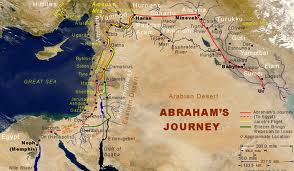I want to continue the discussion in the last blog with a close examination
of the First Reading for the Twelfth Sunday after Pentecost – Genesis 12:1-6.
This text is of immense significance for both Jews and Christians. It is an
account of the covenant relationship between God and the Jewish people. We note that Abram "believed the Lord; and the Lord reckoned it to him as
righteousness". In the New Testament, Paul makes a strong argument that
Christians are likewise beneficiaries of God's covenant with Abraham on the
basis of the same faith (Romans 4).
The first thing, though, we want to consider is the back and forth dialogue
between God and Abram. The word of the Lord came to Abram and Abram listened. Then Abram said to the Lord, and the Lord answered. Then the Lord took Abram outside and showed him the heavens and the stars, and said...to Abram.
What is going on here is a relational connection and it takes place in the present, in the moment. It is this relationship that makes it possible for the word of the Lord to come to Abram and for him to listen and hear. Without the relationship this dialogue would not be possible.
The second thing to note is the trust that Abram has in the Lord. Indeed, his
faith is actually trust. He stakes everything he has and empties himself to trust nothing but God. He goes to a foreign land without knowledge of what lies
ahead. He can only trust God. Furthermore, at his old age, and his wife Sarah
barren, he is promised a child. The odds of this eventuality, in human
knowledge, don't exist. He has only God to trust. (The Epistle Reading Hebrews
11 – explains this best).
Abraham can question God; he will not have answers to all his questions; he
can be disappointed with God – even angry at God. There is nothing wrong with
this as long as the two-way communication channel is open. Our faith or trust in
God is not diminished when we raise questions or express disappointment, nor
does God lose faith in us on that account.
There is an important lesson here because often people from rich or wealthy
nations find it difficult to fathom how people in poor countries manage to be
happier and more content in spite of their abject poverty. In the next post I
share my own experience and how happiness and contentment depend on relationship rather than possessions.
of the First Reading for the Twelfth Sunday after Pentecost – Genesis 12:1-6.
This text is of immense significance for both Jews and Christians. It is an
account of the covenant relationship between God and the Jewish people. We note that Abram "believed the Lord; and the Lord reckoned it to him as
righteousness". In the New Testament, Paul makes a strong argument that
Christians are likewise beneficiaries of God's covenant with Abraham on the
basis of the same faith (Romans 4).
The first thing, though, we want to consider is the back and forth dialogue
between God and Abram. The word of the Lord came to Abram and Abram listened. Then Abram said to the Lord, and the Lord answered. Then the Lord took Abram outside and showed him the heavens and the stars, and said...to Abram.
What is going on here is a relational connection and it takes place in the present, in the moment. It is this relationship that makes it possible for the word of the Lord to come to Abram and for him to listen and hear. Without the relationship this dialogue would not be possible.
The second thing to note is the trust that Abram has in the Lord. Indeed, his
faith is actually trust. He stakes everything he has and empties himself to trust nothing but God. He goes to a foreign land without knowledge of what lies
ahead. He can only trust God. Furthermore, at his old age, and his wife Sarah
barren, he is promised a child. The odds of this eventuality, in human
knowledge, don't exist. He has only God to trust. (The Epistle Reading Hebrews
11 – explains this best).
Abraham can question God; he will not have answers to all his questions; he
can be disappointed with God – even angry at God. There is nothing wrong with
this as long as the two-way communication channel is open. Our faith or trust in
God is not diminished when we raise questions or express disappointment, nor
does God lose faith in us on that account.
There is an important lesson here because often people from rich or wealthy
nations find it difficult to fathom how people in poor countries manage to be
happier and more content in spite of their abject poverty. In the next post I
share my own experience and how happiness and contentment depend on relationship rather than possessions.



 RSS Feed
RSS Feed